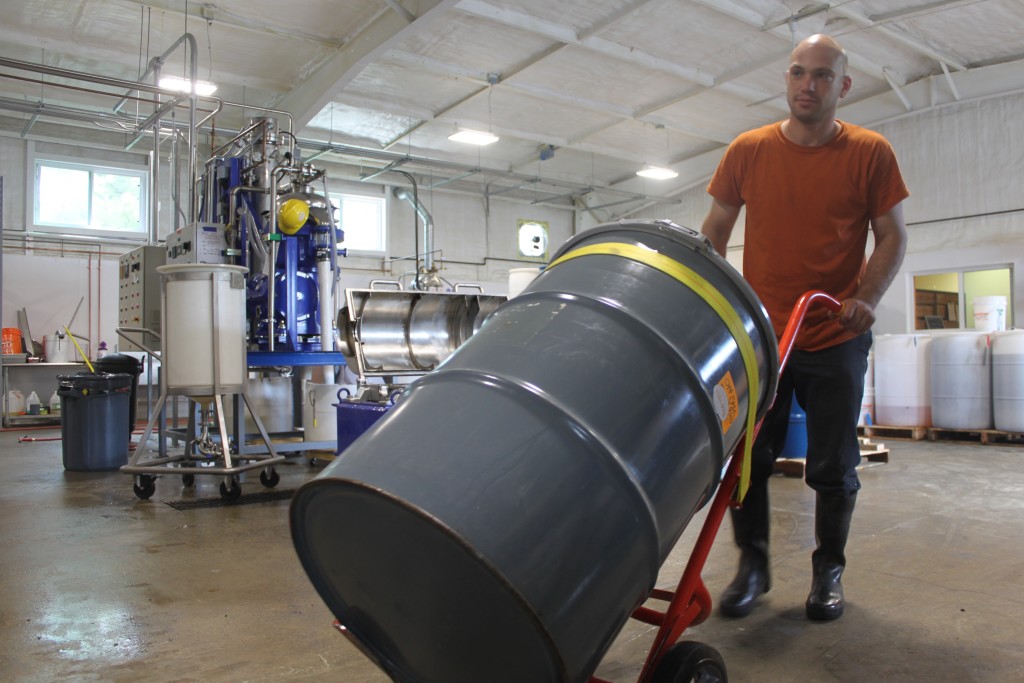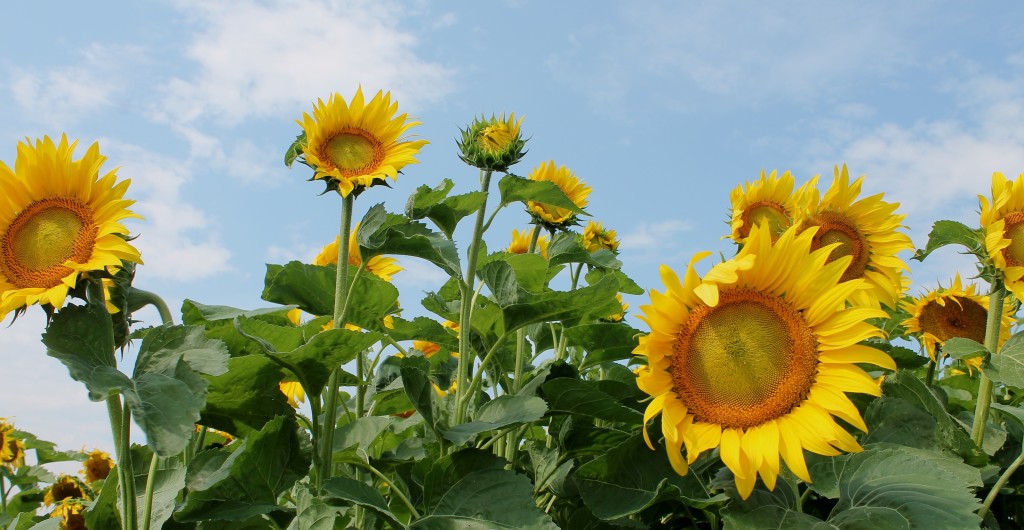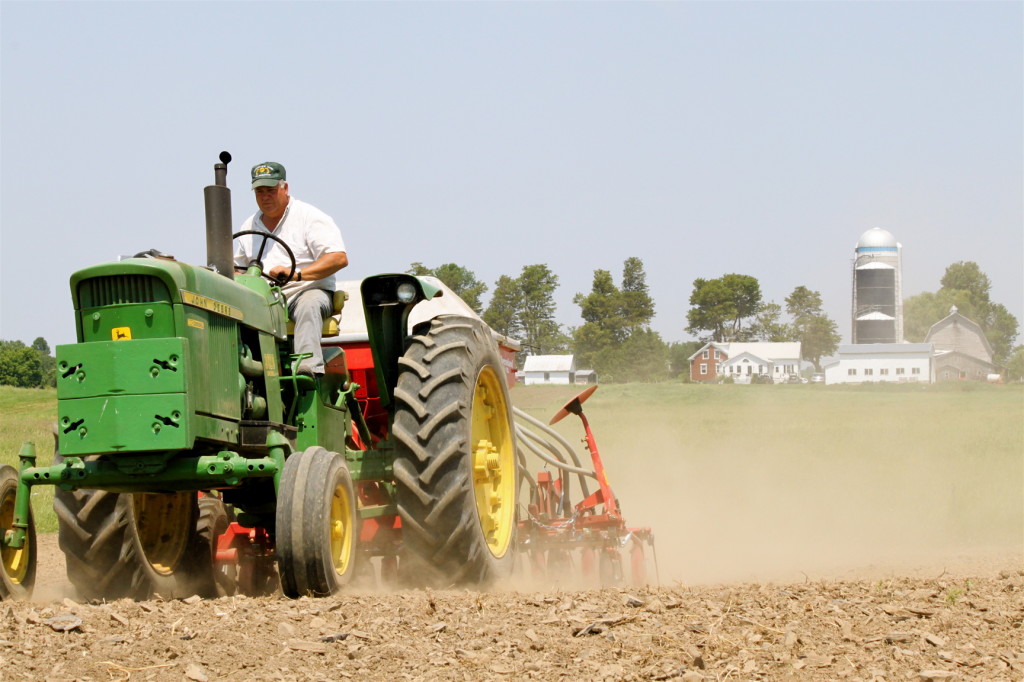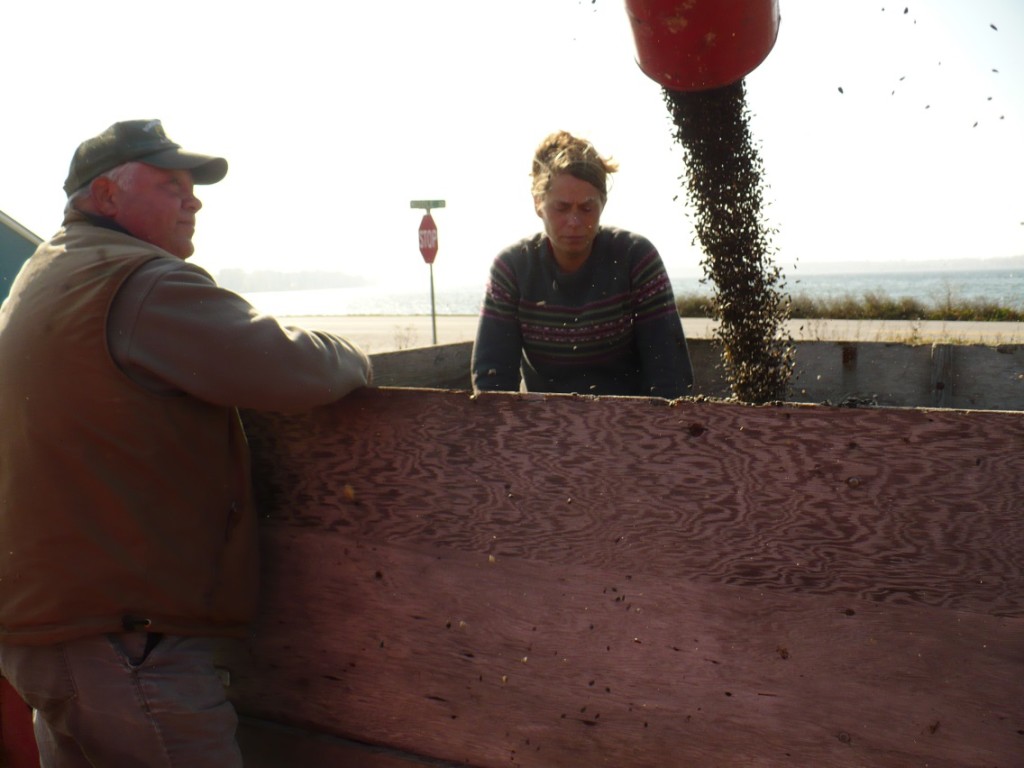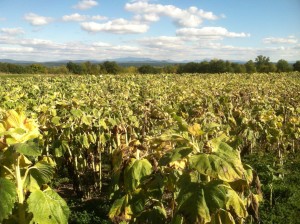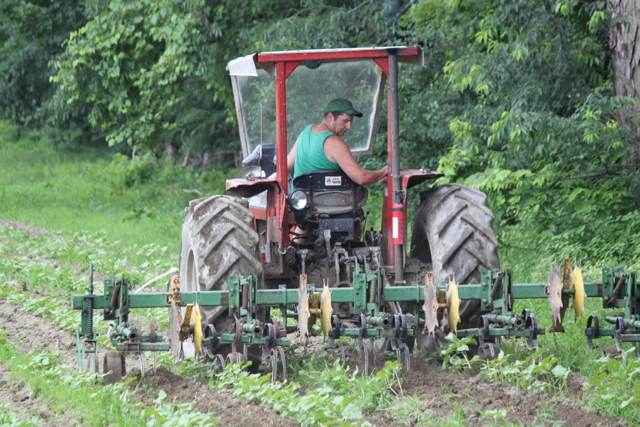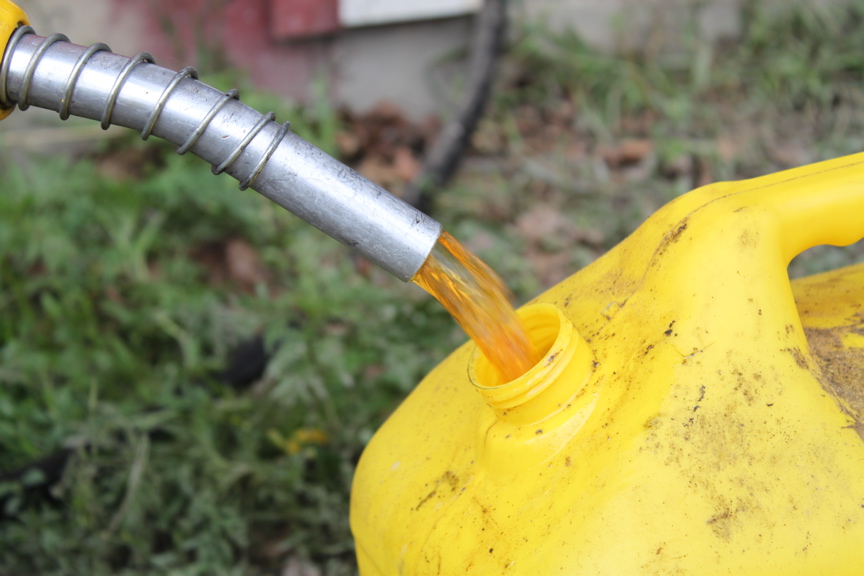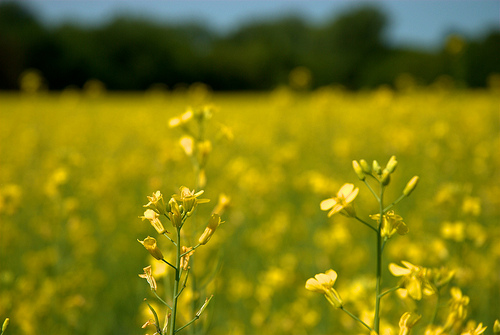In early 2014 Full Sun Company, a small start-up business was co-founded by Netaka White and Davis McManus. Fueled by an interest to help family farms grow, Full Sun began processing sunflower and non-GMO canola oil crops into specialty food-grade oil and high-protein meal for the farmers. Sunflower and canola oil distribution picked up quickly through local CSAs, farm stores, specialty food shops, health and wellness centers, and direct sales to chefs in the Northeast.
Netaka White previously served as the Vermont Bioenergy Initiative’s (VBI) program director, which directly helped to develop the business model to nurture farm partnerships, both as growers and recipients of oilseed meal – the other product that’s generated from making the oil. At Full Sun oilseeds are pressed with large mechanical machinery, producing oil and a granular meal. The team at Full Sun Company learned a lot about seed storage and oil pressing from the early VBI grantees, such as John Williamson of State Line Farm, and Roger Rainville of Borderview Farm.
The first of the two products, the seed meal, has been used as fuel for pellet stoves, or as is the case with Full Sun, sold as fertilizer for crops, or nutritional meal for livestock. At full operation, Full Sun can pump out one ton of meal per day – necessary to meet the growing demand of such customers as The Intervale in Burlington, Vermont and several local pig, poultry, dairy, and beef producers.
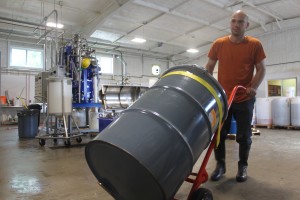
Full Sun Company employee, Zach Hartlyn, moves an off-spec oil barrel for biodiesel production
Credit: Full Sun Company
The second product, the oil, is used as culinary oil for cooking. Staying true to their commitment to an extraordinary culinary product, Full Sun Company diverts any of the oil that does not meet their standards to Vermont Bioenergy Initiative biofuel producers to undergo further processing and become biofuel. Approximately 250-300 gallons of off-spec oil for biodiesel has been processed since February, 2014.
In October, 2014, Full Sun Company halted operation to make room for growth to meet the increased demand for their products and scale up to align with Vermont’s accelerating agricultural economy. White and McManus acquired the former Vermont Soap building in Middlebury, Vermont in order to build a full scale mill and achieve their anticipated greater capacity. Over the course of one of the coldest winters in recent history, the Full Sun team made the renovations and adjustments needed to repurpose the building into the first non-GMO verified oil mill in New England. By March of 2015 Full Sun Company had pressed sunflower and canola seeds to make their first batch of specialty oils. The new operation can yield 130 gallons of oil per day – about 2600 gallons per month!
With no shortage of innovation or ambition, White notes, “David and I are in this with the interest of having a transformative effect on local agriculture and food systems.” Well on their way, the operation is certified GMO free, and the next steps are being taken towards becoming certified organic.
As they grow, Full Sun would like to buy from local grower-suppliers and work with local businesses to package and label feed to be distributed to farmers of varying sizes, from backyard chicken growers to larger operations. Collaborating with Vermont breweries and distilleries is also in queue. Full Sun is working with one local distillery to put together “a package” for farmers so they have markets for profitable grain crops throughout four years of rotation (rye, wheat, sunflowers, etc.) and can offer farmers the indexed prices for these locally grown grains and oilseeds.
19 May 2015
Mitigating Potential Biomass Feedstock Pests
The Vermont Bioenergy Initiative aims to connect diversified agriculture and local renewable energy production for on-farm and community use by supporting research, technical assistance, and infrastructure development in emerging areas of bioenergy including biodiesel production and distribution. As we move into the growing season, there are a variety of pests that can potentially affect sunflower, canola, and soybean biomass feedstock production. In this video a University of Vermont agronomist explains how to control theses potential biomass feedstock pests and increase crop, and eventually biofuel, yields without heavy reliance on pesticides and herbicides.
- February
- Biomass Boot Camp, February 23, Catonsville, MD
- Farm Energy IQ – Training for NE Ag Service Providers in VT February 23- 25, Fairlee, VT
- ACI’s 4th Carbon Dioxide Utilization Conference 2015 February 25-26 San Antonio, TX
- 2015 Executive Leadership Conference. 25 February – 1 March 2015. Phoenix, Arizona
- March
- World Agri-Tech Investment Summit. March 3-4, 2015 San Francisco, CA
- Waste to Biogas and Clean Fuels Finance and Investment Summit. March 3-4 San Jose, CA
- Farm Energy IQ – Training for NE Ag Service Providers March 10-12, 2015 State College, PA
- Advanced Bioeconomy Leadership Conference March 11-15, 2015 Washington, DC
- Next-Generation Defense Energy Symposium. 17 – 18 March, 2015. Washington, United States
- WEBINAR: Using B100 in Our Class-8 Trucking Operations (60 trucks) in Tennessee March 19, 2015 10:00 AM ET
- ACI’s Annual Lignofuels Americas Summit March 25-26, 2015 Milwaukee, WI
- Forest Products and Timberland Investment Conference. March 31-April 1, 2015. New York, NY
- April
- Applying Renewable Energy – Online Training April 01, 2015 at 09:00 AM to June 30, 2015 at 06:00 PM
- Farm Energy IQ – Training for NE Ag Service Providers in NJ, April 8- 10, Bordentown, NJ
- 5th Defense Renewable Energy Summit. 7-8 April 2015. Arlington, VA
- Good Jobs, Green Jobs 2015 April 13 Washington, D.C
- 2015 Northeast Biomass Heating Expo. April 16-18, 2015. Portland, ME
- Introduction to Renewable Energy Technologies Start date: 20 to 22, 2015
- International Biomass Conference and Expo. 20 -22 April 2015. Minneapolis, MN
- 37th Symposium on Biotechnology for Fuels and Chemicals. April 27 – 30, 2015 San Diego, CA
05 May 2014
Small-scale Oilseed Production in the Northeast
Country Folks is a weekly farm paper highlighting the many facets of agricultural life. The publication included an article on two recent webinars on the topic of oilseeds in the Northeast. The article features Roger Rainville, an Alburgh farmer who is growing oilseeds for biodiesel production on his farm, and Penn State and University of Vermont researchers who recently concluded an evaluation of small-scale oilseed presses. 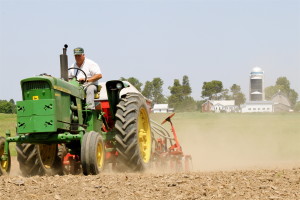
The article talks about growing and harvesting oilseeds, pressing, conversion to biodiesel, and by-product oilseed meal.
Click here to see the full article in Country Folks newspaper.
14 Apr 2014
Farm Fresh Fuel 2014
This guest post was contributed by Hannah Harwood and Dr. Heather Darby at UVM Extension Northwest Crops and Soils Program.
Travel Route 2 through Grand Isle County in early August this year and the rolling yellow fields along the roads will undoubtedly catch your eye. Sunflowers will be in bloom and, more than likely, tourists will be snapping photos. For the second year, growers throughout the county will be participating in a project that supports a small community of individuals who will be producing their own biofuels.
The Farm Fresh Fuel Project—created by UVM Extension’s Northwest Crops & Soils Program and the Vermont Bioenergy Initiative (VBI)—began in 2012 with about a dozen interested growers and 69 acres of sunflowers planted in the islands. Grand Isle County was chosen because it is a agriculturally-diverse community with some existing resources and experience in oilseed production. Participating growers, who signed up in each town in the county in 2012, ranged from seasoned dairy farmers to homesteaders trying their hand at crop production for the first time. All were grateful that the project was taking place in close proximity to technical assistance, equipment, and experienced growers.
That’s the whole idea of the Farm Fresh Fuel Project: developing a small community of individuals who can produce biofuels from the seed to the tank, in a place where the resources already exist to help along the way. Farm Fresh Fuel serves as a sort of small case study for alternative crops and small-scale biofuel production. If all Grand Isle County farmers integrated some amount of biodiesel into their operation, the county could be the first in the nation to have all of its agricultural producers using alternative energy.
Growers who want to participate in the project are responsible for providing the land, meeting fertility requirements, and arranging for planting, cultivation and harvest. In exchange, UVM Extension provides soil tests and interpretation, sunflower seed, technical crop production assistance, and in-season monitoring and insect scouting. After harvest, growers have the option of getting the seed processed at Borderview Farm in Alburgh, a facility with the on-site capacity to clean, dry, and press seed, as well as process raw oil into biodiesel.
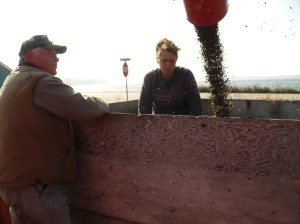
Farm operator Roger Rainville and UVM Extension agronomist Heather Darby watch the sunflower seed flow out of the combine on West Shore Road in Alburgh, 2012. Credit: Hannah Harwood.
In 2012, the average sunflower seed yield was approximately 1400 lbs per acre, though the success of individual fields ranged drastically from one to the next. The most problematic obstacles for Grand Isle producers were birds and weeds, both of which are concerns for almost every oilseed grower in the Northeast. Overall, 28.3 tons of seed were harvested from the county, and Roger and Natasha Rainville at Borderview Farm pressed 2,750 gallons of oil for participating growers, enough to make 2150 gallons of biofuel. When the oil was pressed, what was left was 15.9 tons of sunflower meal—which some participants used to feed livestock or fertilize their vegetables, and some sold to other farmers in the county. Overall, there was a buzz of excitement about these new value-added products—oil, meal, and/or fuel—being produced right in the county.
Though there was increasing interest and an abundance of good intention in 2013, weather conditions in May and June (namely 6.9” of rain above standard 30-year averages) prevented most anticipated fields from being planted on time or at all. The fields that were successfully seeded had decent yields, but the project in general was delayed for a year, giving growers, processors, and weathermen a chance to regroup.
UVM Extension and VBI are excited to facilitate this project again in 2014, with renewed interest from 2012 growers as well as interest from farmers and landowners new to Farm Fresh Fuel. After hosting an informational meeting on March 27 and gauging interest, UVM Extension estimates that at least eight growers will participate this year, putting approximately 60 acres into oilseed crop production for fuel, feed, and fertilizer that’s grown right in their backyard. If the weather cooperates, planters will start rolling through fields in May, and little green sunflower shoots will be visible from the road by June.
April 8, 2014, 1 p.m. Eastern Time
On-Farm Oilseed Pressing for Fuel and Food (link to webinar)
Chris Callahan, Extension Agricultural Engineer, University of Vermont
Douglas Schaufler, Research Associate, Ag Bio Engineering, Penn State
Wondering how oilseed crops like sunflower, soybeans and canola are used on-farm for liquid fuel replacement and feed production? This webinar describes small-scale extraction with examples of different oilseed press usage and and additional processing steps such as filtering and storage. Oil produced on-farm can then be used directly as straight vegetable oil fuel or changed into biodiesel for equipment use. Oilseed meal left following oil extraction is then used for animal feed and other uses. Some farms are diverting a portion of the oil produced into edible oils for consumer sales.
21 Mar 2014
Local Production for Local Use: A Case Study
Prepared by Sarah Galbraith, Vermont Bioenergy Initiative Program Manager, VSJF
Highlights: Cost of biodiesel production = $2.29 per gallon ● Seed meal used as a co-product for livestock feed or crop fertilizer ● Central processing facility and shared equipment use maximizes efficiency for neighboring farms
Roger Rainville’s dairy-turned-energy farm in Grand Isle County is a place where area dairy farmers, organic growers, and landowners have made biodiesel from their own locally-grown sunflower seeds.
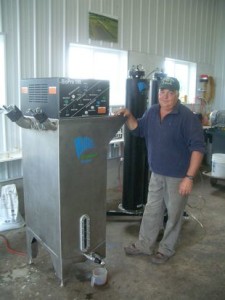
Roger Rainville with BioPro 190 automated biodiesel processor at Borderview Farm. Photo: Vermont Bioenergy Initiative
In 2008, when diesel prices rose from $4 to $5 per gallon, Rainville began experimenting with farm-scale biodiesel production. With guidance from University of Vermont (UVM) Extension and grant funding from Vermont Sustainable Jobs Fund’s Vermont Bioenergy Initiative, Rainville began planting sunflowers on a portion of his 214 acres and installing biodiesel processing equipment. Oilseed sunflowers (as opposed to confectionary sunflowers that are grown for eating) are the most popular oilseed crop in Vermont, with hundreds of acres planted statewide. The crop is grown in rotation with grains and grasses and yields high quantities of oil.
Harvesting, Cleaning, and Pressing
Following harvest with a combine, a seed cleaner and grain dryer are used to prepare the seeds for storage in a 200-ton grain bin prior to processing. A flex auger system moves the seeds from the storage bin into hoppers on each press, and screw augers push the seed through a narrow dye at the front of the press. Extracted oil oozes from the side of the barrel and is collected in settling tanks while pelletized meal is pushed through the dye at the front and is stored in one-ton agricultural sacks. The oil can then be used as culinary oil for cooking or further refined into biodiesel. The leftover seed meal is used for livestock feed, fuel for pellet stoves, or fertilizer for crops.
Biodiesel Processing
The small-scale biodiesel production facility at Borderview Farm is an 800 square foot insulated and heated building (the space does not need to be heated, but the oil should be stored where it will not freeze) that houses an oil press, a BioPro 190 automated biodiesel processor, a methanol recovery system, and a set of dry-wash columns for cleaning the fuel. The clean oil at the top of each settling tank is added to the BioPro 190 processor along with lye, methanol, and sulfuric acid. The automated processor runs through several stages of processing in about 48 hours (esterification, transesterification, settling, washing, and drying), with one break after 24 hours to remove the glycerin byproduct. Safety equipment in the processing facility includes personal protective equipment like aprons, gloves, eye protection, a ventilation system, gas detectors, and spill containment materials. At Borderview Farm a set of standard operating procedures hangs on the wall and blank check-sheets are in a binder to make the process easy to repeat. The finished biodiesel is stored in 250 gallon pallet tanks making distribution to different farms easier. The installed capacity of the facility can process 100 tons of seeds from 138 acres of sunflowers per year, yielding 10,500 gallons of biodiesel and 64 tons of sunflower meal (assuming the state average yield of 1,500 pounds sunflower seeds per acre and operation of 24 hours per day for 260 days per year).
Rainville switched from purchasing diesel for five tractors and one truck to making his own biodiesel. He wanted to be independent of imported fuel, and liked creating a new way for farmers to diversify. “Using land for making biodiesel is not the most economical option compared to some other crops, but it’s about creating opportunities to try something different,” says Rainville.
Sharing Infrastructure Through the Farm Fresh Fuel Project
In 2012 a group of ten farmers working in cooperation with Rainville and UVM Extension—called the Farm Fresh Fuel project—grew 90 acres of sunflowers for development of biodiesel. Cooperating farmers were required to plant, fertilize, weed, and harvest the sunflower crop. Farmers worked to share equipment to accomplish this task. The seed was brought to Rainville for conversion into biodiesel. Rainville did the harvesting for all farms, bringing about 56,721 pounds of seed to Borderview Farm.
Seeds from the ten growers yielded about 3,000 gallons of biodiesel and about 20 tons of meal for livestock feed. The biodiesel and meal were then redistributed to the growers based on the relative volume of sunflower seeds they contributed. One participating dairy farm, Sunset Lake Farms, is using the biodiesel to heat office space, the milking parlor, and water for cleaning and sanitizing equipment, and fed the meal to milking cows at a rate of 3 pounds per day, saving about $3,000 on fuel and feed costs.
Rainville’s annual biodiesel use has ranged from 500 to 3,000 gallons per year. At current prices (over $4 per gallon for diesel and $2.29 per produced gallon of biodiesel) biodiesel has saved him from $500 to $4,000 per year in fuel costs. He also emphasizes energy independence as an added benefit. Plus, any growers that also raise livestock can use the meal, which is leftover after the oil is extracted, as part of their feed rations. Rainville recommends talking with an animal nutritionist to blend this into feed at the right ratio, since sunflower meal has a high fat content.
When asked what advice Rainville would give others who want to make their own biodiesel, he says, “Ask questions, ask questions, ask questions. And ask them again!”
Learn more about energy efficiency and renewable energy in the Energy section of the Vermont Food System Atlas.
Monday, March 3, 2014 at the Sheraton Hotel and Conference Center in Burlington, VT. Join us to learn from growers, processors and researchers about their experience with oilseed crops like sunflower, canola, soybeans and flax. Discuss how these oilseeds can add value to farms in the form of feed, fuel, soil amendments and culinary oil. View the workshop brochure or the detailed agenda for more information. Visit www.uvm.edu/extension/oilseed meeting to register.




